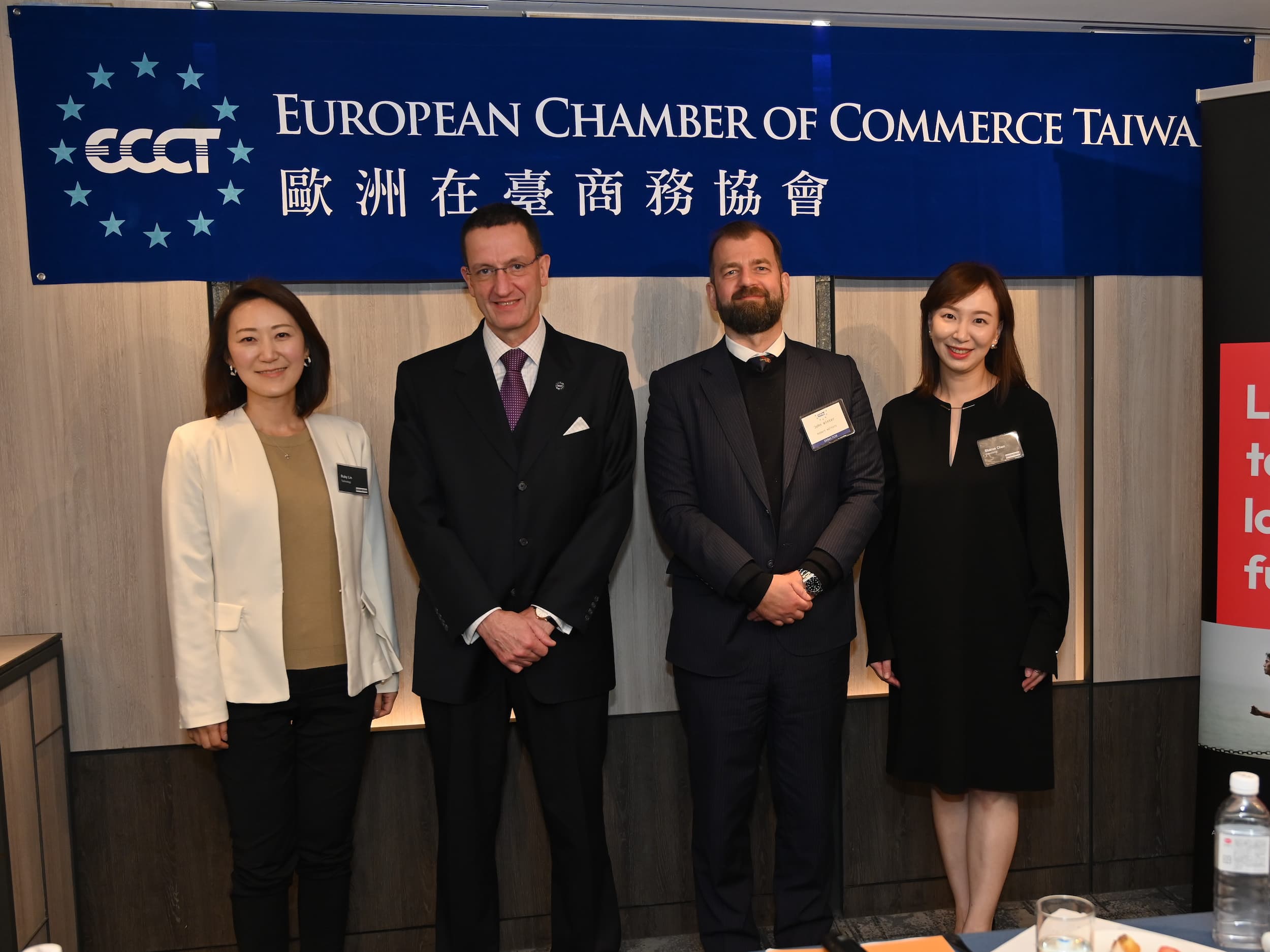Launch of Robert Walters 2024 Salary Survey

The Robert Walters digital Salary Survey 2024 was released by Robert Walters in cooperation with the ECCT at a Premium Event lunch. At the event, John Winter, Country Manager of Robert Walters Taiwan, gave a presentation summarising the main findings of the survey. For comprehensive details, read the survey’s Taiwan Overview.
Looking briefly at regional trends, Winter said that in China last year, the global slowdown and pandemic lockdown prompted organisations to adopt conservative hiring practices. Moreover, multinational companies decreased their investments in China. This year, only 54% of professionals there expect a salary increase. Meanwhile, Hong Kong’s job market remains challenging. Job cuts are expected to continue in some areas, such as investment banking in 2024, due to over-hiring in 2021 and 2022, while some senior positions are still being lost to relocation, although slowing compared to 2023. In Singapore, there were retrenchments in the technology sector in 2023 while there was a slowdown in hiring in financial services, with a lot of senior banking positions moving to Abu Dhabi. However, hiring is still ongoing for regional positions based in Singapore in the retail, luxury goods and fast moving consumer goods sectors.
Taiwan’s job market, like the rest of the region, also encountered challenges in 2023 due to a global downturn. In response, companies adopted a conservative approach, emphasizing cost-control strategies. This cautious stance manifested in various ways, including layoffs, the implementation of hiring freezes, prolonged interview processes, and an increase in the number of layers of approvals and discussions before extending offers to potential candidates.
Looking to the year ahead, persistent challenges, such as geopolitical risks, supply chain restructuring, the CHIPS and Science Act, and economic headwinds in China and the US, continue to pose hurdles. Nevertheless, there is an expectation of a gradual macroeconomic recovery driven by factors like potential interest rate cuts, the completion of inventory adjustments, and the resurgence of end-market demand.
In light of the macroeconomic conditions, the job market in Taiwan is expected to undergo a recovery. This year’s survey indicates that job movers can anticipate a salary increment ranging from 10% to 20%, with an average overall increase falling between 2% and 5% for those who remain in their current positions. Notably, over 65% of professionals are actively seeking new employment opportunities. Despite this, the global scarcity of specific skills may pose challenges for companies attempting to fill vacancies, particularly those requiring expertise in new technologies and niche skill sets. Consequently, 2024 is poised to be a demanding period for recruiting the right talent.
According to the survey, more than 59.1% of professionals express optimism about job opportunities in their fields. In the commerce market, job movers can anticipate a salary increment ranging from 12-18%, and over 75% of professionals are actively seeking new employment opportunities.
However, the prevailing trend of prioritizing cost-control strategies is expected to persist. Robert Walters Taiwan foresees continued longer interview processes and an increase in layers of approvals and discussions before offers are extended to potential candidates.
Driven by cost considerations and in response to senior-level departures and downsizing, companies have actively recruited candidates for junior and mid-level positions, addressing talent gaps. Recognising the scarcity of talent among junior and middle-level candidates, companies are placing a heightened emphasis on hiring and nurturing young professionals.
In 2024, the Taiwanese job market continues to endure talent shortages, leading to a notable increase in cross-industry movements and a heightened demand for candidates returning from overseas. Simultaneously, there is a discernible shift towards a preference for generalized roles, with employers seeking individuals possessing a broader range of skills and experiences rather than focusing solely on specialized roles. This strategic approach allows companies to efficiently fill multiple positions with a single hire, maximizing resources and effectively addressing talent shortages in the job market.
Concurrently, talent attraction and retention have emerged as the foremost priorities for companies operating in Taiwan. Professionals in Taiwan highly value similar attributes in an employer, emphasizing the importance of ‘inspiring colleagues & culture’, ‘excellent compensation & benefits’, and ‘flexible working arrangements.’ John Winter emphasised that “To attract top talent, organisations need to ‘sell’ their benefits, flexibility arrangements, career development, and support framework to prospective candidates and current employees alike.” This underscores the critical role that a holistic and appealing work environment plays in attracting and retaining top talent in Taiwan's competitive job market. On a question on this subject in the Q&A session, Winter remarked that young employees are demanding work-from-home options and won’t apply for jobs that don’t offer them. On the office environment, he said that both the private office space and hot desk office layouts have their benefits and drawbacks. What is likely to be attractive to employees is probably a combination of both as well as other facilities that are appealing to employees and make them want to spend more time in the office.
Despite significant layoffs and hiring freezes in Taiwan's tech industry due to the global downturn in 2023, Taiwan continues to lead in the technology sector, according to the survey. As the inventory correction concludes, the technology industry is poised for growth, driven by emerging applications such as AI, green energy, and smart networking.
The current surge in AI interest, coupled with extensive promotion by global automobile manufacturers, is expected to propel substantial growth in AI servers and electric vehicles by 2027. Moreover, technological advancements and the introduction of large flagship products are projected to boost semiconductor content and value across market segments from 2024 through 2026.
Based on the optimistic outlook for the technology sector in 2024, the sector is expected to face persistent talent shortages. Notably, 66% of professionals are actively seeking new job opportunities in 2024, while 81% of businesses plan to implement pay raises. For job movers, the expected salary increment ranges from 10% to 15%, with an average increase of around 4-5%.
The influence of AI applications is profound and far-reaching, according to Robert Walters. A notable 52% of companies have indicated their intention to delve into the utilisation of AI models, such as Chat GPT, as a means of automating routine tasks and administrative functions, thereby expediting the process of digitalisation. This shift towards AI and digitalisation is generating a considerable demand for professionals skilled in data insight and digital transformation.
The rising demand for candidates with expertise in artificial intelligence (AI) remains a prominent trend. Individuals possessing a profound understanding of constructing and deploying AI models are particularly sought after in the job market. This emphasis on AI-related skills reflects the increasing recognition of the transformative potential of AI applications across various industries.
On the question of succession planning, it seems that few companies are properly prepared to hand over control to the next generation. According to Robert Walters, 43% of global leaders trust successors for executive roles but, in Asia, only 26% of leaders believe their successors are ready while 75% of employees feel that their leaders are not prepared for future challenges. The situation in Taiwan is even more critical. 71% of corporations don’t have solid succession plans and 86% of local corporations face a shortage of senior talent. This problem will only become more acute in the next few years as 30% of management level employees are over the age of 60 while the number of possible candidates to move up in Taiwan is exacerbated by the fact that at least 300,000 talented Taiwanese leave home to live and work abroad every year, according to figures cited by Winter.
The reasons behind the lack of confidence in leadership succession are complicated and can be separated into environmental factors and corporate factors. For one, while leadership and communication skills are key abilities to running a business, most middle managers in Taiwan don’t have opportunities to develop the requisite soft skills in the workplace because of Taiwan’s corporate culture and top-down management style where initiative and questioning are discouraged. East Asian cultures tend to value reflection over urgency, harmony over discord, introspection over feedback, and humility over standing out from the crowd. Managers have therefore not had opportunities to develop and practice strategic thinking and taking risks, which has stifled the development of these leadership skills.
To begin to address the leadership challenge, company leaders need to develop succession plans that offer an attractive career path to potential talent. These plans should promise an upward trajectory for personally fulfilling jobs and leadership roles, define the skills and abilities that need to be developed and create learning and development plans accordingly. Companies would also do well to flatten their leadership structures, provide more autonomy to managers to develop their own solutions and build a culture of allowing mistakes and encouraging innovation.

